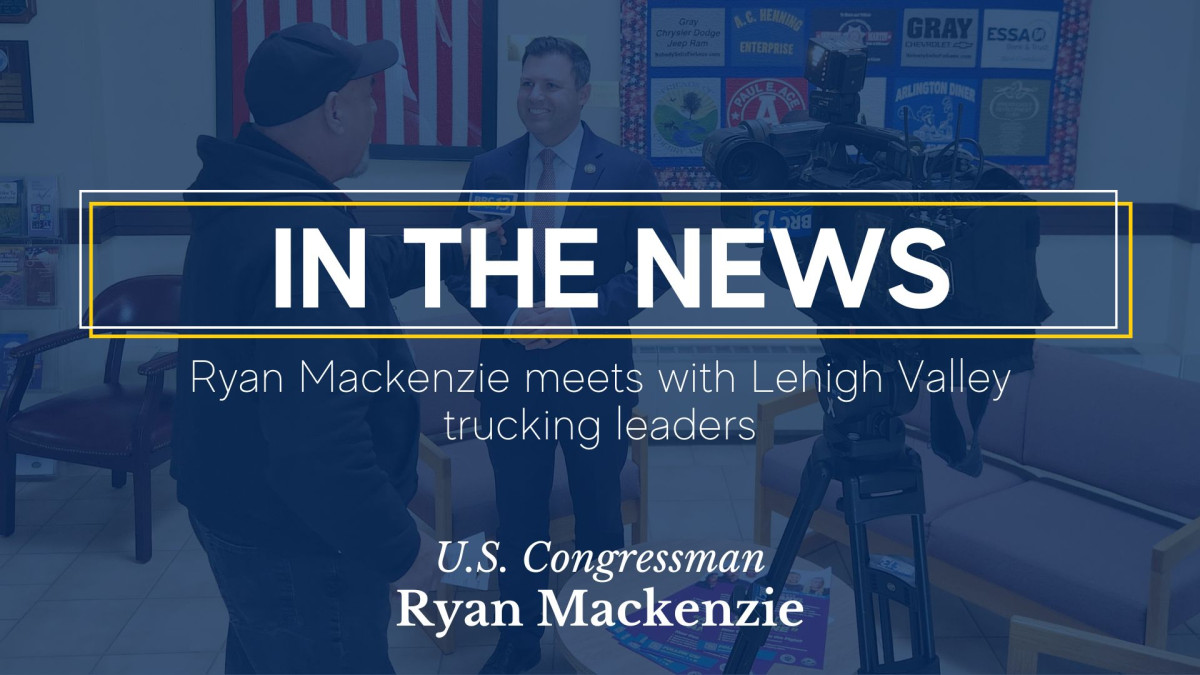Ryan Mackenzie meets with Lehigh Valley trucking leaders.

U.S. Rep. Ryan Mackenzie received a truck-driving lesson Friday afternoon when he visited the Ward Transport & Logistics terminal in Glendon. The first-term congressman drove an 18-wheeler around the building, coming to a smooth stop in front of the main entrance.
Afterwards, Mackenzie, R-7th District, was given a tour of the loading and unloading area before getting behind the wheel of the 2025 International LT tractor.
Mackenzie came to the business near Interstate 78’s exit with Morgan Hill Road to hear from members of the Pennsylvania Motor Truck Association. The group had concerns ranging from government regulations — especially with emissions — to tariffs and infrastructure.
“The trucking industry is responsible for one out of every 15 jobs in Pennsylvania, so that’s quite a lot of employees in the community here and across the whole state,” said PMTA President and CEO Rebecca Oyler. “The whole supply chain relies on truckers and trucking companies just like this one. The vast majority are family owned businesses, so they are affected by things like taxes, lawsuit abuse, and the typical things that affect small businesses.
“It’s also the second most regulated industry in the country, aside from healthcare.”
Company President Bill Ward said since 2019 there has been a 38% increase in wages and a 46% increase in insurance rates. Altoona-based Ward employs 1,700 people, including 110 in the Lehigh Valley.
“We make sure all 1,700 have family sustaining jobs,” Ward said. “We’re very proud of that. But margins are slim, so you want to try to do the best you can for your employees. But we also need to make some money so we can buy new trucks and things like that.”
According to PMTA data, the average yearly wage is $58,258. The trucking industry in the state also paid $1.8 billion in federal and state taxes.
“I’m a big supporter of small and family owned businesses, and I want to make sure that you have not only tax, but regulatory workforce environments that let you thrive and succeed,” Mackenzie said. “Everybody in the Lehigh Valley knows we have a very significant, but also growing, transportation and logistics industry, and that’s been a boon for a lot of businesses.”
He added that track traffic is a concern for many in the Lehigh Valley and there has to be a balance between industry and quality of life.
“It’s a growth challenge for a growing community,” Mackenzie said. “I’ve said this before, I will take growth challenges any day over decline challenges, because when you’re out across Pennsylvania, there are lots of communities that are declining, and once you get into that downward spiral, where people and businesses are leaving, and then tax revenue dries up for your schools and your public services. That only exacerbates the decline and the people out of your community.”
Lack of parking is another concern for the trucking industry. Oyler said there is only one parking space for every 11 drivers in the U.S. She said it’s common to find drivers having to find space on the side of the road after a shift ends. A solution is for local municipalities to require truck parking for new industrial buildings through zoning regulations.
Ward was asked about how new tariffs could affect his business.
“During the pandemic, there was a huge shortage of truck parts, actual tractor availability,” he said. “Mack is still behind. You can get a tractor now in six weeks versus 18 months a few years ago. I think we could be reverting back to that, potentially, with the tariffs.
“But I also think we’re going to see a lot more onshoring because of the tariffs, which I think is the ultimate goal of that, and that will ultimately help our business. There might be some short-term pain for some long term gain.”
Ron Scholler Jr., a sales representative for TransEdge Truck Centers in Allentown, wondered about California air emissions regulations and how Congress may handle it. He said Mack saw sales drop 94% in California when that state’s latest round went into effect in 2024. He added that new restrictions in New Jersey are also affecting sales. A clean energy standard law for Pennsylvania is scheduled to go into effect in 2026 if it isn’t blocked in court.
“No one is saying let’s go back 30 years and blow knocks and soot out of the tailpipes and leave a mile-long train of black smoke,” Scholler said. “But we’re also saying we’re not ready to make this leap to zero emissions.”
The American Trucking Association has maintained that while it is not opposed to decarbonization, it thinks the process is moving too fast, which is adding expenses to the industry.
“When we’re talking about regulations or laws like you’re talking about, it’s what I’ve been saying about DOGE,” Mackenzie said. “The concept is great, right? You support the concept of increasing the amount of zero emission vehicles. That’s a nice thing to shoot for in a goal, but then the execution or the practical application is a whole different story.
“How you get there, how that transition occurs, is what we have to be concerned about, because that’s where the rubber meets the road.”